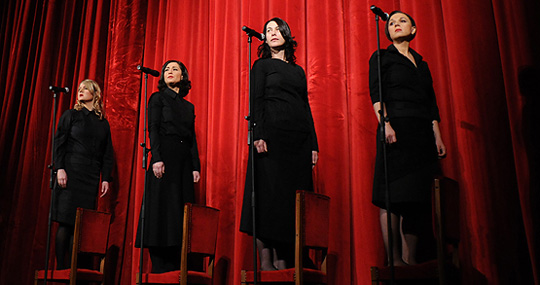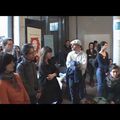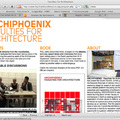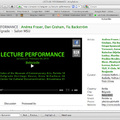Ivet Ćurlin, Ana Dević, Nataša Ilić and Sabina Sabolović , the curatorial group of WHW /(What, How and for Whom) announced the biennial’s conceptual framework during a live performance in November 2009.

© shaofoundation.org.cn
The 11th Istanbul International Biennial's conceptual framework seeks 'to find a way out from the double deadlock of global neo-liberalism and local nationalism,’ and is inspired by Bertolt Brecht's 1928 song 'What keeps mankind alive?' The Croatian curators say the topic and its questions require urgent attention from today’s society.
The Croatian group said their main objective would be “to find a way out from the double deadlock of global neo-liberalism and local nationalism,” while examining economic and social issues covering everything from global poverty to gender inequality. The concept was inspired by the title of Bertolt Brecht’s song “What keeps mankind alive?” from “The Threepenny Opera” – a play that set out to revolutionize theater as both an artistic form and a tool for social and political change.
Since the announcement of the conceptual framework, the question left to ask the What, How and for Whom group is Why? Why did they decide to use Brecht and the question he poses in the Threepenny Opera as a basis for this year’s biennial? In response WHW said Brecht’s question in 1928 is much more urgent and topical today, when society is consumed by fears of global change and lasting effects of the economic crisis.
“The question 'What keeps mankind alive?' will serve as a trigger, as well as a certain script for the exhibition, allowing us and the artists to pose questions of economic and social urgency that are relevant to everyone today," WHW said in an interview with the Hürriyet Daily News & Economic Review.
Not political but didactic
WHW said Brecht’s influence on the biennial will not be so much political, but instead his didactic methodology and technique will be used to help people see the world’s social and political conflicts through art and invite them to think about and engage in these problems and be motivated toward change.
“We hope we will enable audiences to make judgments. This is why we rely on Brecht so people do not just see the evils in the world, but feel the need and see the urgency to change it,” WHW said.
WHW stressed the importance of Didacticism, saying that the exhibition is a learning tool, and it is not the role of WHW to come and preach to people about situations in Turkish society.
“We hope the art works and the way the exhibition is constructed will encourage the audience to think about the role of artistic endeavor in the conditions of contemporary capitalism and allow them to re-evaluate everyday practices and value systems,” WHW said.
Inspired by Brecht, the curators are working for a biennial featuring elements of performance that will spark immediate responses and make the exhibition more engaging. When asked if it will be entertaining, WHW said everyone has a different concept of what entertainment is and the biennial will not be entertaining in the commercial sense but if anything they have insured it will be the opposite of boring. Today, in biennial exhibitions, art is usually presented as fun and pleasurable. Brecht was critical of art solely as a means of entertainment; he was more concerned with making his plays didactic instead of entertaining, because often audiences can get caught up in the ‘fun’ and miss the important contradictions that are presented on stage.
'Some people will hate it'
The WHW were touring Istanbul in January as part of their research for the biennial, and so far from the feedback they have received they have been told their concept is a viable one to play with. “We realize it is a controversial concept and we know some people will hate it but that is fine,” said WHW, adding that they are specifically looking forward to the responses from local audiences, which they imagine will differ from the abstract audiences on the art scene.
WHW said the biennial itself is often criticized as a form in the cultural landscape because they are put together by private sponsorship instead of public funds and therefore might represent special interests, however, they said the Istanbul biennial is not an attempt to solve or conceal these problems.
“Life can go in different directions. What matters here is what you do with this concept and how you relate it to the world around you. The aim is to examine the biennial as a representative form and explore the relation between society and art from social and political perspectives,” said WHW.
© Ceylan Yeğinsu, hurriyetdailynews.com
***
CRITICAL RESPONSE
Paul O'Neill: Curatorial Turn. From Practice to Discourse. esp. the section of Biennial Culture and the Culture of Curation






